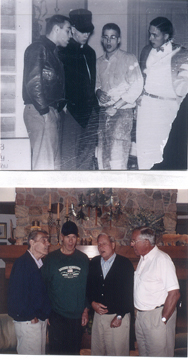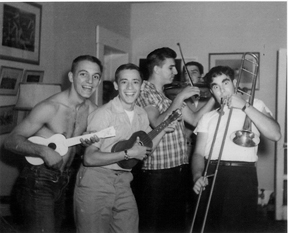Winter 2006: From Our Readers |
| Printer-friendly version | Email this article |
|
Stories behind the stories
In September, the Public Affairs staff started the Wabash FYI blog, a place to tell those stories that don't always make it into print but make Wabash such a great place to work and learn. One reader's comments:
I've enjoyed reading Wabash FYI; it gives us a more intimate and personal perspective of what's happening at Wabash.
Today, I want to thank you for posting the pictures of Wabash in autumn ("Even Canon's Best Can't Get it Right," 11/1). While I wasn't fond of Indiana, I will admit that I most enjoyed the "Indian Summer" days during the fall. The foliage was stunning; it is something I will never forget.
Thank you for keeping all of us connected to Wabash no matter where we are.
—Gary Paul Moore ’04, Amarillo, TX
"Where else but at our College?"
I want to thank you for your recent article mentioning Terry Kilgore ’60 ("Grunge Report," WM Summer/Fall 2005), the "competing interests" that prevented his graduating, and his return to finish his degree 30 years after leaving Wabash. I, too, came back to Wabash to finish my degree. That decision has made all the difference in my life. And, as you noted in the article, it was the same Wabash—only the characters had changed.
My freshman year, I was fortunate enough to have Dr. David Philips and Dr. Eric Dean as my co-advisors, with Dean Moore lending a "guiding" hand. I also owe a debt of gratitude to James Keyes for getting me back to where I belonged. When I returned, there was a new cast. Many professors—some old, some new— helped me, including David Phillips, Roy Miller, Dr. Z, Dr. D., and Bob Olsen. They had the patience of Job. There were more, though: Dean David Miller, Di Springer, Sharon Lawton (always rooted for me—fantastic lady), John Fischer, James Fisher, Bill Placher, Chick Clements, the great Peter Frederick, Joe O'Rourke, Vic Powell, and a host of other "characters."
I can't tell you how hard I worked to get back, get through, and to finish Wabash in 1992. I look back at my trials and tribulations, my triumphs and failures, my family and my current "position" in life and I know it all has happened through the grace of God and Wabash College.
As Tom Runge concluded in his "Grunge Report:" "Where else but at our College?"
—Damian Freeze ’87/’92, Carmel, IN
Nice words, if you could read 'em
I understand your drive to keep the page count down while including everything that you have to print. The subject matter is great; Wabash and the authors are talented.
However, I don't have the time to waste on anything presented in six-point type.You may as well leave it out. Also, the "reverse" printing copy in white on color panels confounds old eyes trying to read. Finally, using page layouts that bleed color panels to the edge of the page and have no copy or graphics in them wastes space that could be used more fruitfully by larger type for the copy.
You've done a good job putting the book out. I would read about Wabash if I had to get a magnifying glass. I just would urge you to have more consideration for old eyes.
—Lloyd Stoner ’59, Fox River Grove, IL
Thanks for your constructive critique, Lloyd. With you and many others in mind, we've increased the type size in sections and cut down on the reversedout type (and enlarged it when we do use it). Please let us know if you can read it any easier—without a magnifying glass this time, we hope.
Just getting better
WM just keeps getting better: so readable, informative, thought-provoking, pride-in-Wabash provoking. Thank you for such a quality product.
—Dick Daniels ’52, Tulsa, OK
Golden oldies
It was the beginning of a barbershop quartet that entertained at various frat dances for the next several years. And last summer, we gathered in upper Michigan to sing together once again—57 years later!
You could argue that it's an actuarial oddity that all these guys graduated, and then survived into the 21st century. And it's nearly miraculous that we actually could remember lots of the words and chords to some of their songs from those Paleozoic times. But they did! Over the better part of a week they sang in the lakeside homes of Klingaman, Littell and Dick Ristine ’41, who even joined the group for a song or two and has a pretty good set of pipes himself.
The capper of the Michigan songfest? After a sumptuous meal at a restaurant overlooking the Leland River, they serenaded the waitress—and were rewarded with an ovation from the other diners! (Of course it's possible those hapless patrons may have been applauding the fact that the noise was finally over.)
—Ted Steeg ’52, New York, NY
Jam session
Periodically, residents of Kingery Hall, an independent dorm at the time, would attempt a jam session playing another's instrument. Our foyer audience would quickly dwindle whenever I would switch to trombone, as seen in this 1954 photo (below).
—Moe Brand ’57, Niskayuna, NY
Still making a difference
The magazine is great on so many levels, and a great reflection on the College and the men and women who make up the Wabash community.
But the article on [Professor of Political Science] David Hadley is the immediate catalyst driving me to write this letter—good to read about his continuing commitment to educate and make a difference in peoples' lives.
—Terry Endsley ’77, Clarendon Hills, IL
|

 The year was 1948. Frank Sparks was first years as Wabash president. The football team produced one Little All-American (Frank Roman, see page 51). President Harry Truman spoke from his campaign train briefly on the Monon tracks behind the football field. And four wet-behind the- ears Rhynies in the Beta house began to sing four-part harmony.
The year was 1948. Frank Sparks was first years as Wabash president. The football team produced one Little All-American (Frank Roman, see page 51). President Harry Truman spoke from his campaign train briefly on the Monon tracks behind the football field. And four wet-behind the- ears Rhynies in the Beta house began to sing four-part harmony. I was one of the musicians mentioned in "Music Every Friday Afternoon" (WM Winter 2005), so Dick Strawn's essay triggered fond memories of Wabash. I was keenly aware that Wabash had no formal music department during my student days, yet thanks to Dick and other faculty and family, there were still opportunities to play and perform.
I was one of the musicians mentioned in "Music Every Friday Afternoon" (WM Winter 2005), so Dick Strawn's essay triggered fond memories of Wabash. I was keenly aware that Wabash had no formal music department during my student days, yet thanks to Dick and other faculty and family, there were still opportunities to play and perform.